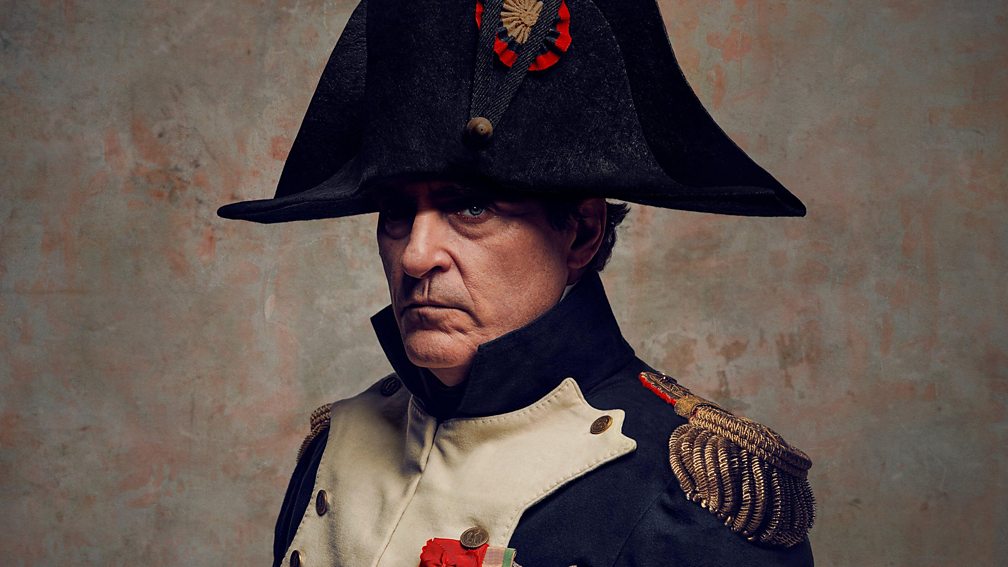By Nicholas BarberFeatures correspondent

Alamy
With spectacular battle scenes and plenty of pithy vignettes, Ridley Scott’s latest – starring Joaquin Phoenix as the French military commander – is ‘a proper, old-fashioned historical epic’, writes Nicholas Barber.
Martin Scorsese is 80 and Ridley Scott is nearly 86, but neither director is showing any signs of slowing down. In recent years, in fact, their films have grown longer, more expensive and more ambitious than ever. The latest example is Napoleon, Scott’s 160-minute biopic of the French military commander and ruler, which sweeps through several countries and several decades, and has several thunderous battle scenes along the way. It’s an awe-inspiring achievement, although it may leave you with a greater appreciation of Scott’s leadership skills than of Napoleon’s.
More like this:
– Was Napoleon really a monster?
It begins in 1789, when Marie Antoinette is guillotined in the French Revolution, while a young gunnery officer, played by Joaquin Phoenix, watches with the heavy-lidded sneer he will adopt for much of the film. The Republic’s new leaders are afraid of being ousted by Royalists or invading Brits, and so they send this scruffy Corsican soldier to the town of Toulon to liberate a fort occupied by British soldiers. Just as he is about to attack, he adjusts his famous hat from a jaunty off-centre angle to a neat symmetrical one – and so it is that he begins his rise to greatness.
The ferocious battles that follow are all spectacular, all distinct from each other, and all easy to follow. Amid the smoke, blood and chaos, Scott ensures that you can see who’s winning and why. As cavalrymen charge across misty plains and infantrymen get blasted to pieces by cannonballs, Napoleon is a reminder that no other director makes films like Scott does. That clarity is there when its hero is striding through palaces and cathedrals, too. Captions spell out who is speaking and where they are, so there is an obvious purpose to all of his encounters with the world’s politicians (played by a succession of British character actors and comedians, mercifully sticking to their own accents).
He meets his match in the Duke of Wellington, played by Rupert Everett – the one man who sneers more contemptuously than he does – but the most important encounter in his life is with Joséphine, played by Vanessa Kirby. This widowed aristocrat entrances him at first sight, and Kirby is coolly charismatic enough to account for the coup de foudre. Poised yet down-to-earth, her eyes twinkling, she always seems to be smirking at a joke that only she understands. Phoenix’s performance is just as enjoyable. A distant relative of the Emperor he played in Scott’s earlier epic, Gladiator, his Napoleon is relaxed to the point of sleepiness when he’s on the battlefield, a petulant brat in meetings, and a tongue-tied arrested adolescent where women are concerned.
Napoleon
Director: Ridley Scott
Cast: Joaquin Phoenix, Vanessa Kirby, Ludivine Sagnier, Rupert Everett
Run-time: 2hr 37m
Release date: 22 November
Still, the film doesn’t reveal why he is so deeply in love with Joséphine, or whether she is in love with him at all. Phoenix reads out many of Napoleon’s adoring letters to his wife in voiceover, but they don’t explain why he feels as if he is barely worthy of her, even when he has conquered half of the world and she has shared her boudoir with half of his colleagues.
That vagueness is true of the other relationships, too. The film serves as a terrific precis of Napoleon’s career, a beautifully illustrated Wikipedia page that ticks off most of the major events in his adult life. The screenwriter, David Scarpa, has scripted lots of pithy and sometimes very funny vignettes, and it’s easy to luxuriate in the dozens of stately homes, the hundreds of gorgeous period costumes, and the countless extras that Scott lays before us. Scene by scene, his proper, old-fashioned historical epic is terrific fun. But it lacks insights into who Napoleon is or what he wants, where he comes from or why he is such a success. Nor does it delve below the surface of the geopolitics around him. It is never clear why he is fighting a particular battle or signing a particular treaty, and because it isn’t clear, it is difficult to care about their outcomes.
Scott has already announced that he is preparing a four-and-a-half hour director’s cut of Napoleon, so perhaps that version will fill in a few of the blanks. The current version, impressive as it is, is entertaining without being engrossing. It feels like a tantalising trailer for the longer and presumably richer and deeper film that is still to come.
★★★★☆
Napoleon is released on 22 November.
If you liked this story, sign up for The Essential List newsletter – a handpicked selection of features, videos and can’t-miss news delivered to your inbox every Friday.





